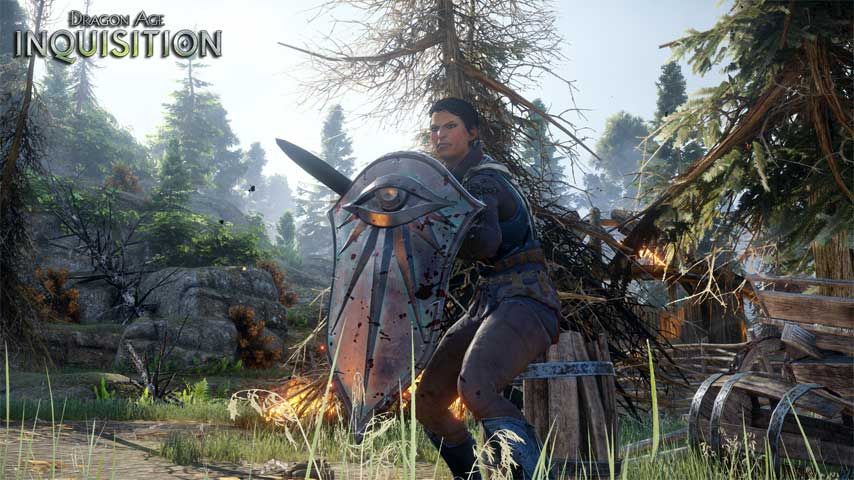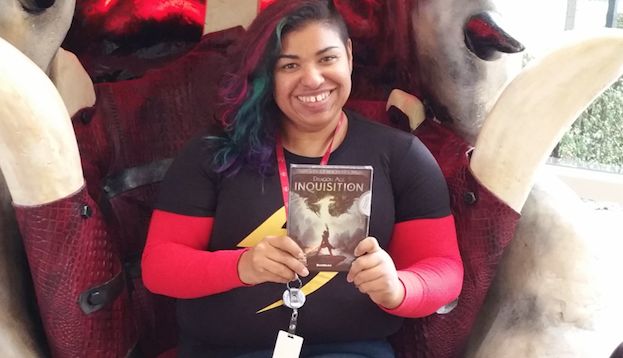A few weeks ago, the [a]listdaily ran an article explaining how involvement of women in the video game industry was growing, with a 52 percent chunk of overall gamers consisting of women. We also briefly talked about prominent women in the industry, including Jade Raymond and Amy Hennig.
What we didn’t elaborate on, however, was the struggle that many women face finding such a place in said industry. GamerGate (which continues to be an ongoing — and very ugly — issue), along with acceptance in eSports and development circles, are incredible hurdles — and a few industry peers stated that the previous article didn’t go nearly in depth on these issues.
So, to follow up, the [a]listdaily spoke in-depth to a couple of women in the industry to get their take on particular issues, including finding a place within it.
Bianca Anderson, Global Programs Specialist of Talent Acquisitions for Electronic Arts, gave her take on these issues. This is the first of two interviews, the second of which will be with #INeedDiverseGames creator Tanya D.
Some eSports-based male gamers have expressed disinterest in seeing women in their hobby (and even went as far as saying they would “rape” them, as one player said a few weeks ago), while some companies feel that having separate tournaments for the groups is the answer. What’s your take on this?
Separate tournaments are the lazy solution — you make the “safety” argument while refusing to correct the bad behavior that creates an unsafe and uncomfortable environment for women and other marginalized groups. eSports are still fairly new and working to be taken seriously, so I think it behooves them to make dealing with harassment and sexism a major priority. I’ve seen arguments about trash talk vs. actual threats, and my take there is — rape is not a joke, don’t include it in your trash talk, and you should be penalized if you do. Trash talk may work in small settings with friends, but it doesn’t belong in a professional event, which is why the NFL and other pro sports leagues fine people for unsportsmanlike conduct.
Personally, I find it pretty damn ludicrous to gender segregate eSports. Video games are all too often presented as a male dominated hobby, despite the fact that 48 percent of gamers are female — allowing this perception helps contribute to male gamers feeling that they should be able to exclude women. eSports are a perfect opportunity to combat that perception. You don’t even have the argument of different physical abilities based on sex as you do with traditional sports. The ability to sit in a chair for hours pressing buttons while drinking Mountain Dew is pretty sex and gender neutral.
Do you feel that certain male gamers are intimidated by the strength of female gamers, or do you think they just refuse to shake the notion that it’s a “man’s world” when it comes to their approach to games?
I personally think that the fear of change is a bigger issue than being intimidated by strong women. Others have said it better than me, but there’s this consistent thread of power/fantasy fulfillment that some of these gamers are afraid will change. Geeks, nerds, gamers, whatever you want to call us, a lot of us were the weird, social outcast kids who got picked on for having weird hobbies, being socially awkward, or un-athletic, etc. So along come video games where you get to play bad-ass heroes and rescue damsels and you are basically the center of the universe and everything is awesome. That is an INCREDIBLY heady fantasy — but the problem is everyone likes fantasy, and the focus on the sexually exploitative, violent fantasy aimed at the male gaze of white, straight, cis-gendered males age 18-24 leaves a LOT of people out in the cold. What if I want to be the mighty warrior who rescues a Prince instead of a Princess What if I want my wish fulfillment fantasy to look like me, but more bad-ass Red Sonja aside, I don’t think I’d feel bad-ass in a metal bikini, I think I’d feel cold and possibly chafed in uncomfortable places.

Once women and other marginalized groups started speaking up and asking for games that appeal to more people, some of the core gamers feared that all their wish fulfillment and power would be taken away, which is not what most of us want. You can play GTA V, or The Witcher, or CoD, or Battlefield and it doesn’t concern me in the least, even if those aren’t my games of choice. What I personally see most from women and others is that we want MORE games. You don’t have to get rid of games to make more, but you have to expand your horizons, and that’s what we’re looking for. Additionally I expect that if you ARE playing a game where you can murder a sex worker and take your money back, you need to have the mental faculties to look at the game critically and understand how it’s problematic. You can like problematic things — I like plenty of them, but just because I like something doesn’t mean it’s above criticism.
I think this is the big problem some gamers have with Anita Sarkeesian — they don’t understand that critique is necessary to art, and critique and censorship are two extremely different things. If games want to be taken seriously as art, critique is necessary. Art without critique is just propaganda. They want to have their hobby taken seriously, but they also don’t want to have to examine what certain games and their desire to play them may say about them, our culture, and issues of social inequality.
Do you think companies should just let loose and have tournaments where all players are welcome?
100 percent absolutely, yes. And they 100 percent need to have very specific rules about appropriate behavior. Many cons these days have anti-harassment policies clearly placed, and that’s what I think we probably need for eSports tournaments.
GamerGate is a rather ugly subject — and it’s exploded beyond the original argument over ethics in gamer journalism. As a result, certain women in the industry were affected, such as Zoe Quinn and Brianna Wu. Why do you think things have gotten so far out of hand with the death threats and what not?
“Rather ugly” is the sweater your Aunt Myrtle gives you for Christmas, GamerGate is a whole new level of horrifying. I think it’s important to realize though, that the behavior associated with Gamergate is not new, and it isn’t specific to just them. Anytime women choose to publicly express opinions online (or in person) especially about “geek” topics, they receive backlash from a group of “men” (and I use that term REALLY loosely) who want to shut them down and are willing to do so in a way that’s basically an embarrassment to the entire human race.
GamerGate was a perfect storm — you had Zoe Quinn, who had already faced previous harassment for reasons I honestly have trouble even wrapping my brain around, her seriously terrible ex who decided to take a personal experience and make it extremely public, in hopes of hurting her, and a lot of people already pissed by the idea of “Social Justice Warriors” coming in and “ruining” their “identity” as gamers. Add some D-list celebrities who decided to cash in on a group of people who lacked the ability to critically examine the way they were being manipulated, and you just get a shit-storm of epic proportions. They topped it all off with a catchy hashtag and suddenly you have a harassment campaign/hate group masquerading as a “consumer revolt,” complete with a name, a logo, and a whole lot of terrible behavior.
I think in the beginning there were probably some really earnest, well-meaning people who were actually concerned about ethics in journalism. There may still be some left — but the GamerGate name has been so hopelessly besmirched by hateful, disgusting people who have turned it into something reprehensible, that I think it’s just totally beyond redemption. I just can’t imagine the kind of person who thinks that harassment, threats, “doxxing”, “SWATting”, and stalking is an acceptable response to someone doing something you don’t like in your hobby space. The presence of rapidly changing technology bringing people closer together and a justice system that has no idea how to deal with the online world just makes it a dangerous new frontier.
Do you think social media makes it too easy for certain male gamers to lash out It seems like Twitter’s lack of punishment for certain threats may not be helping, especially where Zoe and Brianna are concerned?
This is a complicated one — I’d say it’s less social media itself and more that the world isn’t ready to deal with the weaponization of social media. The US justice system in particular is WOEFULLY, almost criminally, inadequate when it comes to dealing with electronic crimes and harassment. Let’s face it, police have trouble dealing with threats of sexual assault, harassment, or violence against women terribly well in “meat space” let alone cyberspace. Technology is outpacing our laws at a rate that’s more than a little terrifying, and our national fear of science and technology doesn’t help us create policies and practices that can help stem the tide of problems. I’m not qualified to advise, but it’s a serious issue that really needs to be addressed. I believe, in the long run, the positives of social media seriously outweigh the negatives, but that doesn’t mean we shouldn’t be focusing on those problems and figuring out ways to address them.
Do you have any advice for those that want to take a crack at entering the video game industry?
I get this question a lot, and I think my answer might surprise people — personally I recommend that you stop focusing on the industry and instead focus on your skills. There’s nothing wrong with having an end point in mind, but gaming companies will recruit people from an amazing range of other industries; the key is to make yourself a valuable commodity. Want to do art Focus on your art, building your portfolio, etc. Same for programmers, analysts, etc. — concentrate on building your skills and experience. I think people get really hung up on getting into the industry, but plenty of people transition into games from other industries after they’ve become more established in their specialty. I personally fell into the gaming industry almost completely by accident because I had administrative and communication skills that were valuable to my employer — at the time in didn’t even occur to me to think of working in gaming, even though I love games.
That being said, there’s nothing wrong, and everything right, with keeping up with the industry, with trends in gaming, and working on building a network and creating opportunities for meeting people in the industry. Twitter is actually a great place to network, and of course LinkedIn. Go to conventions and conferences if you can, talk to people. Be respectful and don’t make it all about you — and don’t expect them to help you get a job just because you said hi, no one really wants to feel like they’re being used. Be genuine and engaged, no matter who you’re dealing with, and learn to talk to strangers, it is probably the most useful skill you will ever develop!
You can follow Bianca on Twitter at @biancajand.

